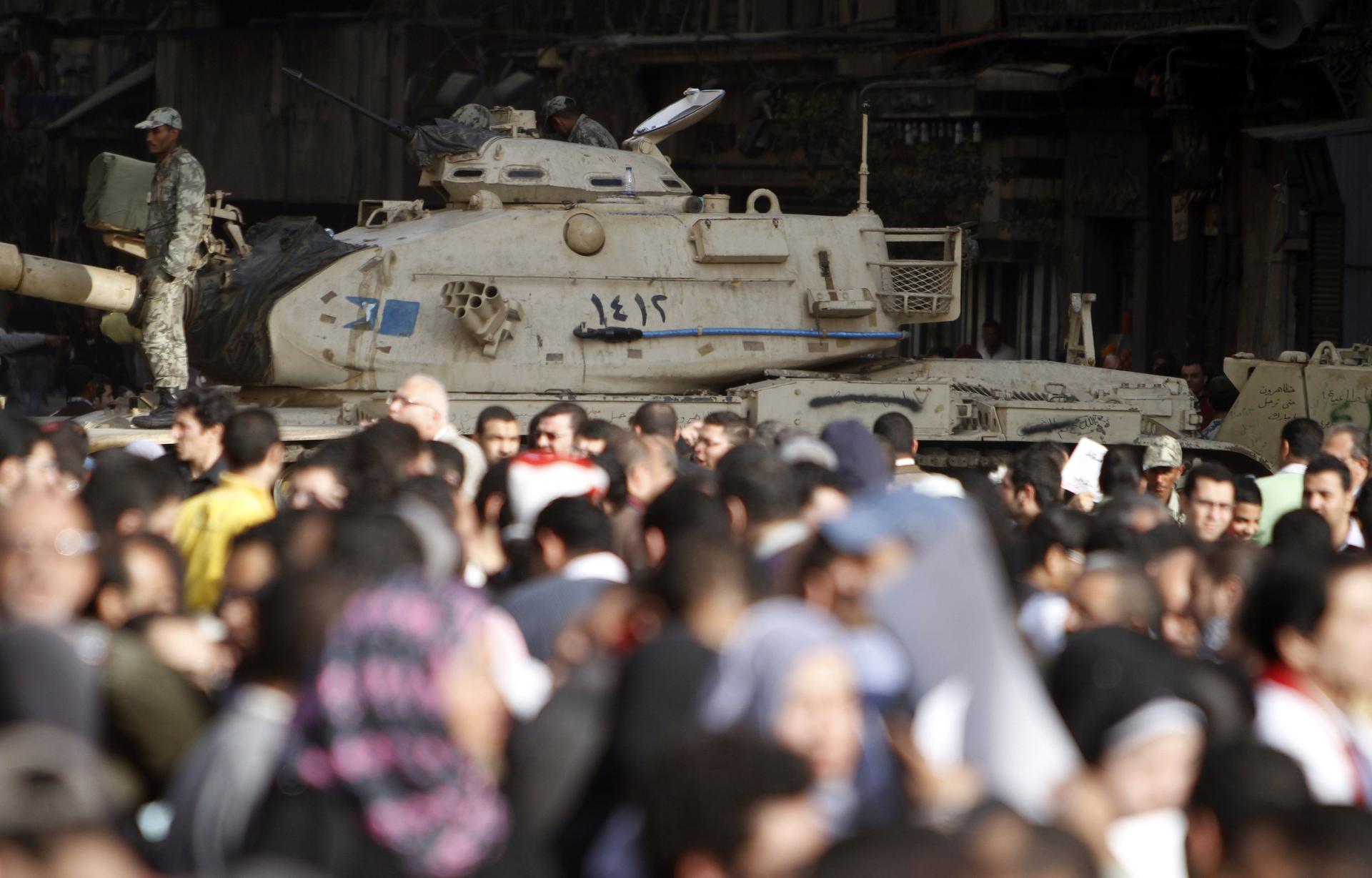A kidnapping scheme so big it involves Egyptian soldiers, Sudanese police, and Eritrean diplomats
Egyptian demonstrators gather in Tahrir Square close to a military tank in 2011. The military has long been the true arbiter of power in Egypt.
CAIRO — Berhan left his home in Eritrea at night so he did not have to explain. His children were asleep — sick with the flu. He expected to find work in Sudan, something better than the conscription he faced at home.
Instead, the Sudanese border guards who apprehended him sold him to a gang, the first link in a brutal human trafficking network which kidnaps refugees in Sudan, smuggles them to the arid Sinai peninsula, and tortures them to extort ransoms of $30,000 or more from their families.
For two weeks, his children heard nothing of their father.
Then one day they got a call. Berhan had to tell his family that they would have to find $33,000, or, like many hundreds of others, he would die in the Sinai.
Since 2010 more than 25,000 people have become victims of the trafficking gangs, and more than $600 million has been paid in ransoms, according to estimates in a report published by Tilburg University in the Netherlands.
But Berhan, whose real name must be withheld for his safety, noticed something particularly sensitive during his ordeal. Along the way, he says he saw an Egyptian officer manning a checkpoint wave the traffickers and their human cargo past: Individuals in the Egyptian Armed Forces, the most respected body in the shifting Egyptian power structure, and a final arbiter in politics since the beginning of the republic in 1952, may be involved in this human trafficking.
Berhan’s account is typical of several testimonies of the trade's victims collected in a Human Rights Watch report published Tuesday. In interviews I conducted on behalf of Human Rights Watch I heard multiple stories of Egyptian and Sudanese officials' facilitation or involvement in the trafficking. These testimonies echoed written testimonies from other victims, compiled independently by a local NGO.
11 witnesses reported the collusion of Egyptian police and army personnel with traffickers in 19 incidents. The testimonies also implicate officers of the Sudanese police and army.
One teenager described how he was forced to flee military service in Eritrea, after he was discovered keeping a diary where he wrote down his ideas about democracy and justice. In Sudan, police gave him to traffickers. Held in the Sinai, like other captives, he was beaten, electrocuted, and sexually assaulted with burning hot metal.
"They poured petrol over us so that our skin came off,” said another man imprisoned with him. “They made us drink water with petrol in it and when we vomited we had to drink the vomit… We wanted to commit suicide but they took our necklaces from us. Then we refused to eat and begged them to kill us but they refused."
With some others, the two found a discarded pair of scissors, and used it to gradually chip their chains away from the wall. They surprised the guard, and ran into the desert as the sound of shooting rang out behind them. Eventually, with the help of locals opposed to the trade, they made it to Cairo.
It has long been suspected that government officials in Sudan and Egypt were turning a blind eye to human trafficking, but no proof has emerged until now.
A trafficker interviewed in November 2012 by HRW, stated: "Until December 2011, all the police at the bridge and tunnel took bribes to let us bring Africans into Sinai. Sometimes the police even drove the trucks across. In December, the military took over control of the bridge. Sometimes they make it difficult to cross at the bridge and tunnel, but they still take bribes and let us cross."
In 2010, a 26-year-old man told HRW that he recalled Egyptian soldiers coming to the house where he and other Eritreans were being held, forced to work for their captor.
"I worked about two weeks in his house and while cleaning there I saw two Egyptian soldiers — wearing military uniform, green and brown and spotted — come to the house three times. Each time it was the same two men and each time they just looked at us, cleaning the house … Some of the other Eritreans in our group managed to escape. Some never came back but soldiers caught one group of five people about an hour after they had escaped and brought them to the trafficker holding us," he said.
A spokesman for Egypt's Foreign Ministry denied the charges in a phone interview, and said that an ongoing military campaign in Sinai against jihadist insurgents and smugglers has all but stamped out the trade since July 2013. Activists monitoring the trade agree that its volume has greatly reduced in the past six months, but say that since November it has begun to grow again.
The United Nations Security Council Monitoring Group on Somalia and Eritrea has alleged in several reports that senior Eritrean military figures are behind the kidnapping ring in Eastern Sudan, and that ransom payments are often channelled through Eritrean diplomats or security offices.
Berhan’s family eventually paid his ransom, and he made his way to Cairo, where his application for refugee status is still being processed. He is able to talk to his wife and children by phone now. As an illegal émigré from Eritrea, however, he would face harsh punishment if he were to return. He may never see his family again — unless they, too, one day, attempt the treacherous flight across the border.
Editor's note: The author of this story, a freelance journalist in Cairo, was hired by Human Rights Watch to conduct video interviews to accompany Human Rights Watch report mentioned above. The victims' stories appearing in this piece have come both from these interviews and from typewritten testimonies (of separate victims) provided by a local NGO.
